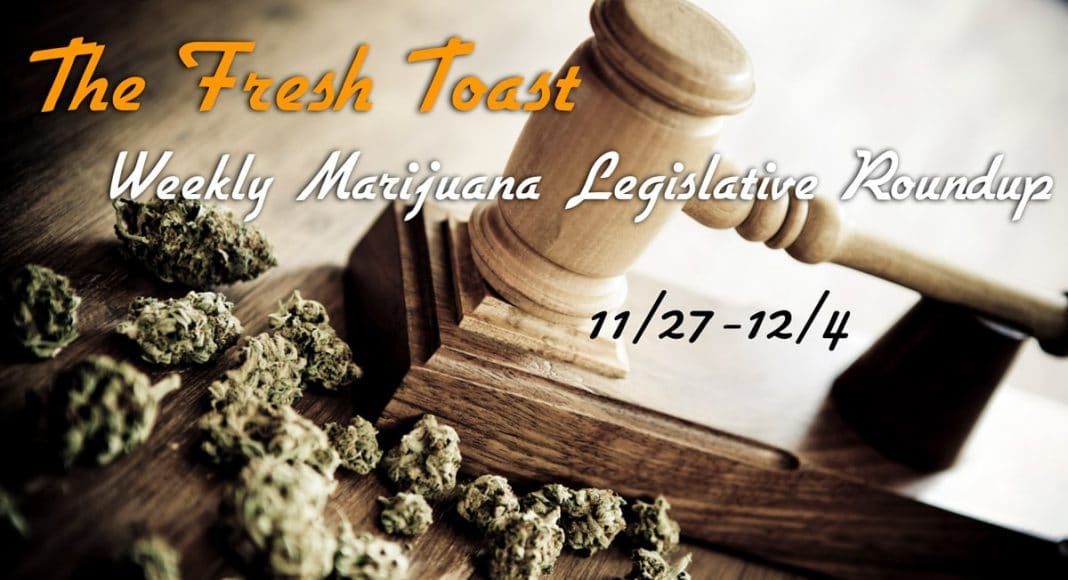Last week was a busy time for marijuana legislation from Maryland finally allowing medical marijuana sales in the state to San Francisco approving a regulatory framework for recreational retail. There were also key developments in North Dakota and Minnesota. Read all about these developments and more in The Fresh Toast’s Marijuana Legislative Roundup for Dec. 4.
National:
On Thursday, Senator Cory Gardner (R-CO) withdrew an amendment to the Senate tax reform bill that would have removed tax penalties for state-legal marijuana businesses. Section 280E of the tax code prohibits businesses associated with “trafficking” federally controlled substances from taking tax deductions granted to all other businesses, effectively forcing cannabis businesses to pay up to 90 percent of their earnings in federal taxes. Gardner’s amendment, known as the Small Business Tax Equity Act, would have exempted marijuana businesses from Section 280E as long as they remained in full compliance with state law. The final version of the tax reform bill passed without the amendment by a narrow majority in the early hours of Friday morning.
-
Related Story: Colorado Senator Wants To Lower Tax For Marijuana Businesses
Maryland:
On Friday, medical marijuana sales began in Maryland after years of delays following the state’s 2014 medical marijuana reform. Under Maryland law, physicians, nurse practitioners, dentists, and some other healthcare workers can be certified by the Medical Cannabis Commission to prescribe cannabis for patients with a wide variety of ailments. Patients suffering from any severe condition for which other treatments have been ineffective can seek medical marijuana authorization, as well as those suffering from a condition that causes severe or chronic pain, appetite loss, seizures, or other debilitating symptoms. Glaucoma and PTSD are also included on the list of qualifying conditions. Maryland’s first medical marijuana law was enacted in 2013, but quickly failed due to a lack of interest among the academic institutions charged with running the program. A series of scandals, judicial challenges, and regulatory delays have further delayed the program’s implementation since the 2014 reform.
- Related Story: Maryland’s Cannabis Dispensaries Are Finally Set To Open
California:
On Tuesday, the San Francisco Board of Supervisors approved a regulatory framework for recreational cannabis businesses to operate in the city starting next year. The regulations approved by the Board include a 600-foot buffer zone between marijuana businesses and schools, licensing preference for businesses that commit to hiring locally and mentoring people from communities that have been most harmed by the War on Drugs, and other basic licensing rules that localities are required to implement under California law. If Mayor Ed Lee approves the rules quickly, sales could begin as soon as January 5. So far, very few California cities and counties have approved the necessary regulations for recreational sales to begin within their jurisdictions, which will delay the beginning of recreational sales across much of California beyond the state’s official January 1 start date.
-
Related Story: Marijuana Ads May Be Banned On San Fran Muni Buses
North Dakota:
On Tuesday, supporters of marijuana legalization submitted a draft petition to the North Dakota Secretary of State to put the question of recreational marijuana before voters. If passed, the initiative would legalize the growth, consumption, and sale of cannabis for adults 21 and older. It would also seal the records of anyone convicted for marijuana-related offenses made legal by the measure. Secretary of State Al Jaeger will review the petition and decide whether or not to approve it. If approved, supporters would need to gather a minimum of 13,452 signatures for the measure to be placed on the ballot next year. Supporters failed to garner enough signatures for the 2016 ballot, but voters did approve a medical marijuana initiative that year.
Minnesota:
Last week, the Minnesota Health Commissioner announced that the state would add sleep apnea and autism to the list of qualifying conditions for patients to obtain medical marijuana authorization. Every year, the Health Department takes public input on conditions that should be added to the list and reviews each condition in coordination with a citizens’ review panel. Suggested conditions that were rejected this year include anxiety, dementia, and Parkinson’s disease. The addition of autism and sleep apnea in July 2018 will bring the total to 13.


